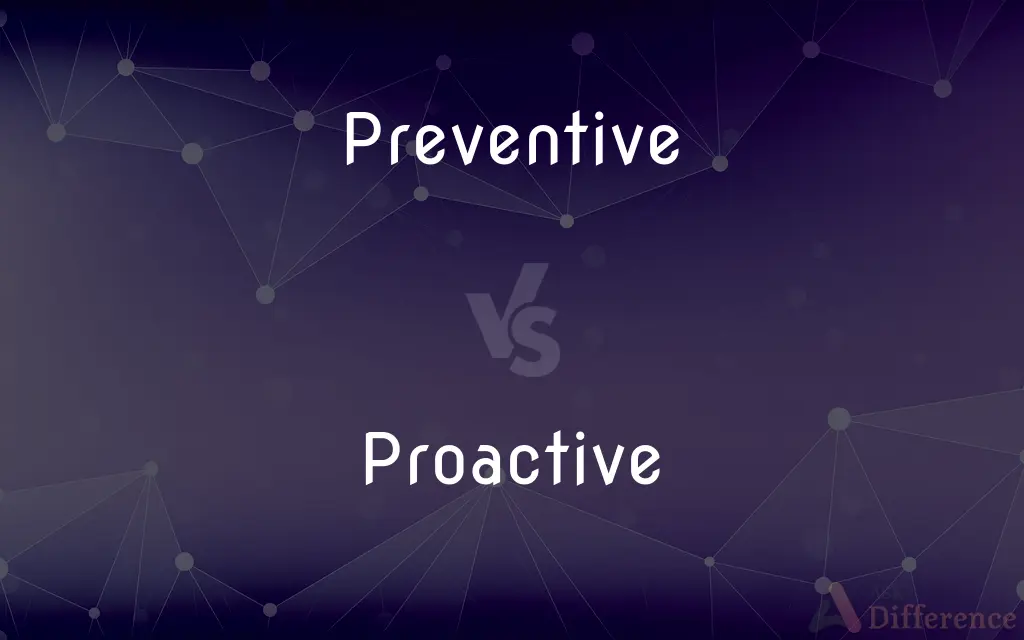Preventive vs. Proactive — What's the Difference?
By Urooj Arif & Fiza Rafique — Updated on March 29, 2024
Preventive actions are taken to avoid potential problems before they occur, focusing on minimizing risks. Proactive actions involve taking initiative to change a situation, often by anticipating future challenges and acting in advance to address them.

Difference Between Preventive and Proactive
Table of Contents
ADVERTISEMENT
Key Differences
Preventive measures are typically designed to stop something undesirable from happening, such as diseases or accidents, by taking steps ahead of time to minimize risk. On the other hand, proactive measures go beyond mere prevention, involving foresight and planning to not only prevent negative outcomes but also to create positive results.
While preventive actions are often reactive in nature, aiming to mitigate the impact of a possible future event, proactive actions are anticipatory, aiming to change the outcome entirely. Proactive strategies involve identifying opportunities for improvement and taking deliberate action to seize them, whereas preventive strategies focus on identifying and reducing risks.
Preventive strategies are crucial in contexts like health and safety, where the goal is to avoid harm. Proactive strategies, however, are more aligned with strategic planning and innovation, where the goal is to create a future advantage.
In practice, being preventive can be seen as a subset of being proactive. While all preventive actions are proactive in nature, not all proactive actions are preventive. Proactive behavior might include innovating new processes or products, whereas preventive behavior focuses on safeguarding existing conditions.
Despite their differences, both preventive and proactive approaches are essential in various fields. Preventive measures ensure stability and safety, while proactive measures drive growth, improvement, and competitive advantage.
ADVERTISEMENT
Comparison Chart
Objective
To avoid negative outcomes
To change or improve future outcomes
Nature
Often reactive to potential risks
Anticipatory and initiative-taking
Focus
Minimizing risks and preventing issues
Seizing opportunities and strategic planning
Contexts
Health, safety, maintenance
Innovation, strategic growth, improvement
Outcome
Maintenance of status quo, risk reduction
Future advantage, positive change
Compare with Definitions
Preventive
Risk Mitigation.
Vaccination campaigns are preventive measures to control the spread of diseases.
Proactive
Strategic Planning.
A company conducts market research to develop new products proactively.
Preventive
Health Screening.
Regular health check-ups are preventive, aiming to detect conditions early.
Proactive
Market Adaptation.
Adapting business models in anticipation of consumer trends is proactive.
Preventive
Maintenance Work.
Routine car maintenance prevents unexpected mechanical failures.
Proactive
Skill Development.
Upskilling employees before a technology shift is a proactive strategy.
Preventive
Security Protocols.
Cybersecurity measures are preventive against potential data breaches.
Proactive
Environmental Conservation.
Implementing green practices before regulations demand it is proactive.
Preventive
Safety Measures.
Installing smoke detectors in homes is a preventive action against fire hazards.
Proactive
Innovation.
Investing in renewable energy technologies is a proactive approach to sustainability.
Preventive
Designed to keep something undesirable such as illness or harm from occurring
Preventive medicine
Proactive
(of a person or action) creating or controlling a situation rather than just responding to it after it has happened
Employers must take a proactive approach to equal pay
Preventive
A medicine or other treatment designed to prevent disease or ill health
Quinine was used as a malaria preventive
Proactive
Acting in advance to deal with an expected difficulty; anticipatory
Proactive steps to prevent terrorism.
Preventive
Intended or used to prevent or hinder; acting as an obstacle
Preventive measures.
Proactive
Acting in advance to deal with an expected change or difficulty
We can deal with each problem as it pops up, or we can take a proactive stance and try to prevent future problems.
Preventive
Carried out to deter expected aggression by hostile forces.
Proactive
Descriptive of any event or stimulus or process that has an effect on events or stimuli or processes that occur subsequently;
Proactive inhibition
Proactive interference
Preventive
Preventing or slowing the course of an illness or disease; prophylactic
Preventive medicine.
Preventive health care.
Proactive
(of a policy or person or action) controlling a situation by causing something to happen rather than waiting to respond to it after it happens
Preventive
Something that prevents; an obstacle.
Preventive
Something that prevents or slows the course of an illness or disease.
Preventive
Preventing, hindering, or acting as an obstacle to.
Preventive
Carried out to deter military aggression.
Preventive
Slowing the development of an illness; prophylactic.
Preventive
(obsolete) Going before; preceding.
Preventive
(dated) A thing that prevents, hinders, or acts as an obstacle to.
Preventive
(nonstandard) A thing that slows the development of an illness.
Preventive
A contraceptive, especially a condom.
Preventive
Going before; preceding.
Any previous counsel or preventive understanding.
Preventive
Tending to defeat or hinder; obviating; preventing the access of; as, a medicine preventive of disease.
Physic is either curative or preventive.
Preventive
That which prevents, hinders, or obstructs; that which intercepts access; in medicine, something to prevent disease; a prophylactic.
Preventive
Remedy that prevents or slows the course of an illness or disease;
The doctor recommended several preventatives
Preventive
Any obstruction that impedes or is burdensome
Preventive
An agent or device intended to prevent conception
Preventive
Preventing or contributing to the prevention of disease;
Preventive medicine
Vaccines are prophylactic
A prophylactic drug
Preventive
Tending to prevent or hinder
Preventive
Tending to ward off;
The swastika...a very ancient prophylactic symbol occurring among all peoples
Common Curiosities
Why is it important to be proactive?
Being proactive allows individuals and organizations to anticipate changes and act in advance to seize opportunities or mitigate risks.
How do preventive actions contribute to safety?
Preventive actions, like safety drills or health screenings, minimize the risk of accidents or diseases, contributing to overall safety.
Can a strategy be both preventive and proactive?
Yes, strategies can be both if they aim to prevent issues and also create positive changes or advantages.
What is the main difference between preventive and proactive?
Preventive actions aim to avoid negative outcomes, while proactive actions seek to change or improve future outcomes.
How does being proactive affect innovation?
Proactive strategies often lead to innovation by encouraging the exploration of new ideas, technologies, and processes.
How do proactive measures influence competitive advantage?
Proactive measures can create a competitive advantage by positioning a company ahead of trends and innovations.
Is being proactive always beneficial?
While generally beneficial, being overly proactive without sufficient analysis can lead to unnecessary actions or resources being wasted.
Can preventive measures eliminate all risks?
While they significantly reduce risks, it's often impossible to eliminate all risks entirely.
What role does foresight play in proactive strategies?
Foresight is crucial in proactive strategies as it involves anticipating future trends, challenges, or opportunities to plan and act accordingly.
What is the importance of preventive measures in public health?
In public health, preventive measures can significantly reduce the prevalence and impact of diseases, saving lives and resources.
How can one develop a proactive approach?
By regularly analyzing trends, seeking opportunities for improvement, and planning ahead to address potential challenges.
What are examples of preventive measures in the workplace?
Ergonomic assessments to prevent work-related injuries and cybersecurity measures to prevent data breaches are examples.
What are the challenges of implementing a proactive approach?
Challenges include accurately predicting future trends, the potential for overextension, and ensuring buy-in from all stakeholders.
How do organizations balance preventive and proactive strategies?
Organizations balance these strategies by assessing risks, forecasting future trends, and allocating resources to both prevent issues and seize growth opportunities.
How do environmental policies benefit from a proactive approach?
Proactive environmental policies can anticipate and mitigate the impact of climate change, promoting sustainability and conservation efforts before crises escalate.
Share Your Discovery

Previous Comparison
Glycolysis vs. Gluconeogenesis
Next Comparison
Astasin vs. AstasiaAuthor Spotlight
Written by
Urooj ArifUrooj is a skilled content writer at Ask Difference, known for her exceptional ability to simplify complex topics into engaging and informative content. With a passion for research and a flair for clear, concise writing, she consistently delivers articles that resonate with our diverse audience.
Co-written by
Fiza RafiqueFiza Rafique is a skilled content writer at AskDifference.com, where she meticulously refines and enhances written pieces. Drawing from her vast editorial expertise, Fiza ensures clarity, accuracy, and precision in every article. Passionate about language, she continually seeks to elevate the quality of content for readers worldwide.














































